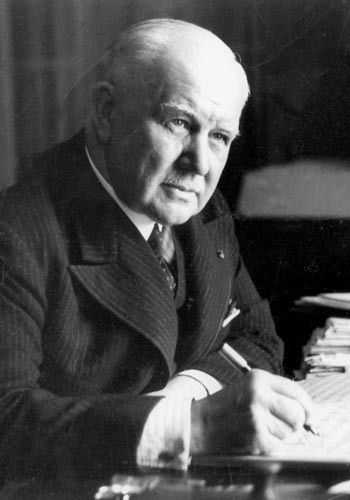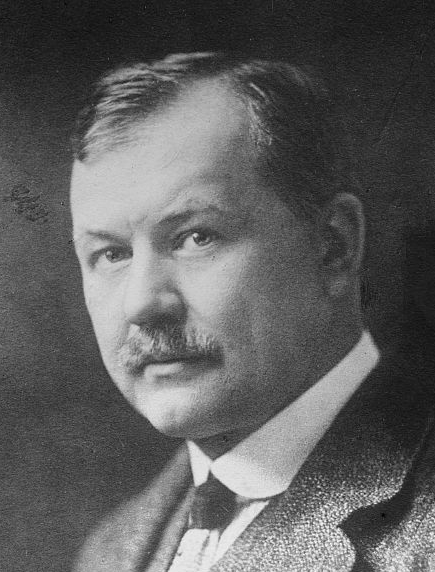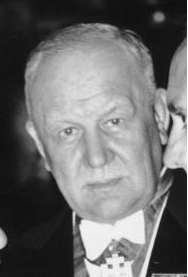<Back to Index>
- Educator Jean Baptiste de La Salle, 1651
- Composer Franz Lehár, 1870
- 10th Minister President of Prussia Albrecht Theodor Emil Graf von Roon, 1803
PAGE SPONSOR



Franz Lehár (30 April 1870 – 24 October 1948) was a Hungarian-born composer who worked in Austria. He is mainly known for his operettas of which the most successful and best known is The Merry Widow (Die lustige Witwe).
Lehár was born in the northern part of Komárom, Kingdom of Hungary, Austria - Hungary (now Komárno, Slovakia), the eldest son of a bandmaster in the Infantry Regiment No. 50 of the Austro - Hungarian Army.
While his younger brother Anton entered cadet school in Vienna to become a professional officer, Franz studied violin and composition at the Prague Conservatory, where his violin teacher was Antonín Bennewitz, but was advised by Antonín Dvořák to focus on composing music. After graduation in 1899 he joined his father's band in Vienna, as assistant bandmaster. In 1902 he became conductor at the historic Vienna Theater an der Wien, where his first opera Wiener Frauen was performed in November of that year. He is most famous for his operettas – the most successful of which is The Merry Widow (Die lustige Witwe) – but he also wrote sonatas, symphonic poems, marches, and a number of waltzes (the most popular being Gold und Silber, composed for Princess Pauline von Metternich's
"Gold and Silver" Ball, January 1902), some of which were drawn from
his famous operettas. Individual songs from some of the operettas have
become standards, notably "Vilja" from The Merry Widow and "You Are My Heart's Delight" ("Dein ist mein ganzes Herz") from The Land of Smiles (Das Land des Lächelns). Lehár was also associated with the operatic tenor Richard Tauber, who sang in many of his operettas, beginning with Frasquita (1922),
in which Lehár once again found a suitable post-war style.
Between 1925 and 1934 he wrote six operettas specifically for Tauber's
voice. By 1935 he decided to form his own publishing house,
Glocken-Verlag (“Publishing House of the Bells”), to maximize his
personal control over performance rights to his works.
Lehár's relationship with the Nazi regime
was an uneasy one. He had always used Jewish librettists for his operas
and had been part of the cultural milieu in Vienna which included a
significant Jewish contingent. Further, although Lehár was Roman Catholic,
his wife, Sophie (née Paschkis) had been Jewish before her
conversion to Catholicism upon marriage, and this was sufficient to
generate hostility towards them personally and towards his work. Hitler
enjoyed Lehár's music, and hostility diminished across Germany
after Goebbels's intervention on Lehár's part. In 1938 Mrs. Lehár was given the status of "Ehrenarierin" ('honorary Aryan by marriage'). Nonetheless,
attempts were made at least once to have her deported. The Nazi regime
was aware of the uses of Lehár's music for propaganda purposes:
concerts of his music were given in occupied Paris in
1941. The Lehárs did not remain silent bystanders towards the
regime: they presented Hitler with a 50th birthday present in 1938.
Even so, Lehár's influence was limited: despite his attempts to
personally secure Hitler's guarantee of the safety of one of his
librettists, Fritz Löhner-Beda, he did not prevent the murder of Beda and his wife in Auschwitz-III. Franz
Lehár spent most of his adult life outside of Hungary but,
nevertheless, Hungarian remained his first language until his death. He continued to sign his name in Hungarian fashion, family name first, with a diacritic over the "a". He died in 1948 in Bad Ischl, near Salzburg where he was also buried. His younger brother Anton became the administrator of his estate, promoting the popularity of Franz Lehár's music. He was elected an honorary citizen of Sopron in 1940. In 1940 Hitler awarded him the Goethe-Medaille für Kunst und Wissenschaft. Several towns in the Netherlands have named streets after him (e.g. in Leidsche Rijn, Utrecht and Tilburg). In 1947, Lehár conducted the Tonhalle Orchester Zürich in a series of 78-rpm recordings for English Decca (released in the U.S. by London Records)
of overtures and waltzes from his operettas. The recordings had
remarkable sound for their time because they were made using Decca's
"full frequency range recording" process, one of the first commercial
high fidelity techniques. These recordings were later issued on LP and
CD. A compilation of his recordings has been released by Naxos Records. The main theme to Lehár's "Vivias" was recorded by saxophonist John Coltrane's quartet on the 1963 release Live at Birdland. However, on the track listing the song is called "Vilia".